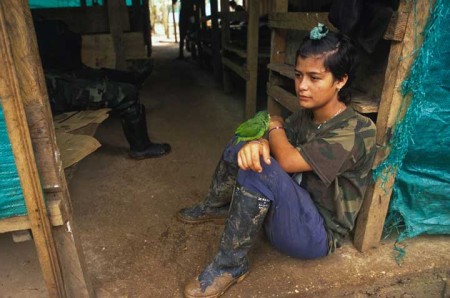On February 20, 2002 an emotional Colombian President Andres Patrana announced his government’s decision to halt its three-year effort to negotiate a settlement to the 37-year-old war with guerrillas from Latin America’s largest and longest standing armed insurgency– the Armed Revolutionary Forces of Colombia (FARC.) The coup de grace to the Peace Process came earlier that same day when FARC rebels hijacked a plane and kidnapped one of the passengers–Senator Jorge Gechem, President of the Senate Peace Commission.

The demilitarized zone where insurgents of the Revolutionary Armed Forces of Colombia (FARC) and the Colombian government tried to hammer out a peace process. With collapse of the talks the special demilitarized zone has become a battleground again.
These events led to a narrowing focus for government policy and an almost exclusive reliance on a military perspective in analysis of the dynamics of the conflict. In addition the motivations of the parties in conflict were re-interpreted and described as a struggle against terrorism and more specifically narco-terrorism.
This effectively severed any understanding about conflict dynamics from multiple historic motivations. Colombia is a country with a history of social exclusion, an absence of institutions of the State (apart from than the armed forces) in many areas of the country as well as complex dynamics of retribution in a conflict in which every side has suffered tremendous loss.
It was a failure with consequences not only for Colombia but also for Central America and the United States.
Links: